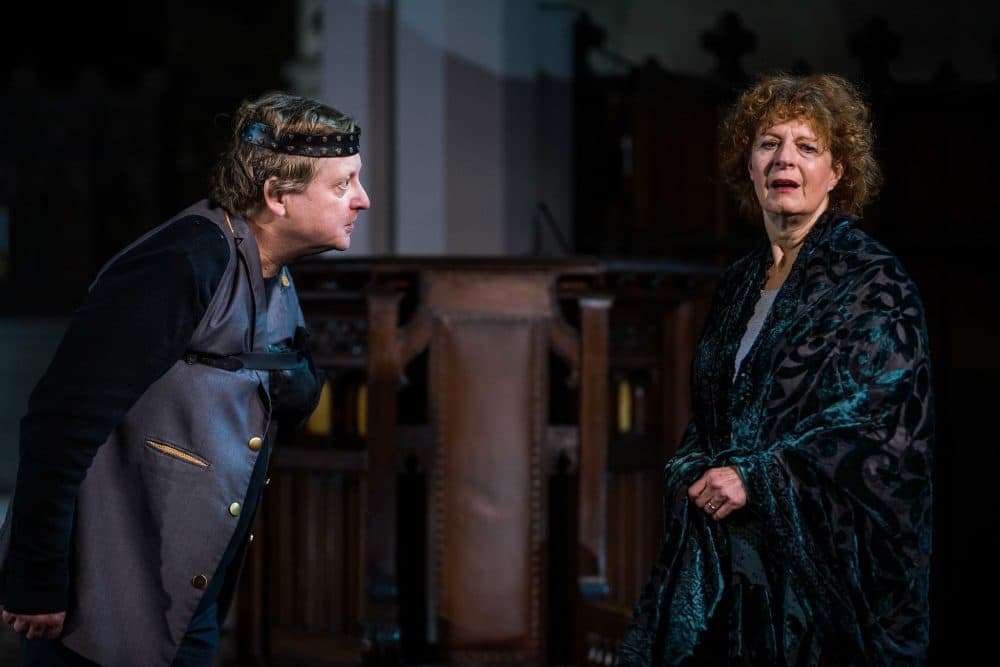Advertisement
Commentary
Richard III In The Age Of Donald Trump: You Can't Look Away

Shakespeare is always timely.
Last fall, I sat in on rehearsals for Actor’s Shakespeare Project’s all-female production of "Julius Caesar," which shone an Elizabethan light on the #MeToo movement. Nothing like a bunch of women wearing daggers to deliver the message that we will be heard.
In this winter of our discontent, I watched a different ASP cast and crew prepare for "Richard III," another play about the rise and fall of an ambitious political leader.
"Julius Caesar" made international headlines last summer when a bunch of America Firsters rushed the stage in Central Park, upset that the Roman emperor was decked out to look like The Donald — never mind that Obama got the same treatment a few years earlier.
I doubt "Richard III" will get that kind of attention although Donald Trump is much more like Richard than Caesar. Both DT and R3 followed unorthodox routes to power, both held women in contempt and treated them badly, and both traded in false piety when it served their purpose. Watching them in action is like witnessing a car crash in slow motion: It’s impossible to look away.

Trump is why "Richard III" is being performed in at least 15 states, according to a quick Google search, and six countries, including Germany and Taiwan. The African American Shakespeare Company in San Francisco is doing R-to-the-3, and a production in Tulsa recently featured an all-female cast. I counted four British companies mounting the play, including Shakespeare’s Globe — a modern reconstruction of his theater — where Sir Mark Rylance (theater royalty) will play the title role, heading a historically accurate all-male cast.
But regardless of how many Richards tread the boards, no director is going to dress the title character in a long red necktie and a blonde wig — not for fear of protesters, who are actually good for ticket sales- - but because it would break the play.
In order for theater to work, the audience has to suspend a whole lot of disbelief to accept the fiction that those people on stage are actually who they pretend to be. Dressing Richard III as Donald Trump would be like putting Dracula in a pink tutu and toe shoes. Richard, arguably the nastiest, most articulate and self-aggrandizing villain in world literature, would be unwatchable if presented as a buffoon with the vocabulary of a fourth-grader, even if that buffoon has access to the nuclear codes.
Richard outdoes Trump in blood. He kills an inconvenient wife; Donald merely pays his off. Richard has his rivals assassinated; Donald stops at character assassination.
In mendacity, they are equals, but Richard revels in it. He turns to us and explains that he was the one who sent his brother to the Tower (to be killed), and persuades his powerful friends (he calls them “simple gulls”) that the Queen and her allies were responsible for his brother’s imprisonment, which sets the stage for him to be “revenged upon” (to kill) them. He boasts,
But then I sigh; and, with a piece of scripture,
Tell them that God bids us do good for evil:
And thus I clothe my naked villainy
With old odd ends stolen out of holy writ
And seem a saint, when most I play the devil.
As for Donald, it remains a mystery whether he intentionally scatters lies to deflect attention, or whether he believes his own whoppers, or whether he knows the difference between truth and falsehood. (Fake news?) Unlike honestly evil Richard, Don insists that he is a paragon of honesty. “Believe me.”
What Richard calls “villainy,” Trump calls “an innocent form of exaggeration,” in "The Art of the Deal."
“People want to believe something is the biggest and the greatest and the most spectacular," he wrote. “I call it truthful hyperbole. It’s an innocent form of exaggeration — and a very effective form of promotion.”
At the end of the play, Richard is killed in battle. The curtain will come down on Donald, too. It can’t come soon enough, but the wheel will turn.
